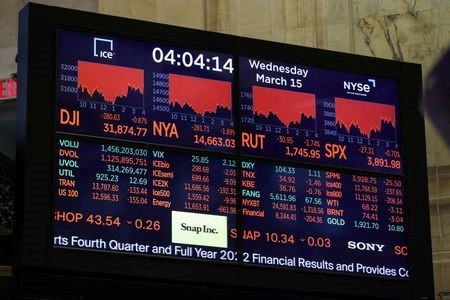




Philippines Trade Update: Imports weaken on tepid demand
 DOWNLOAD
DOWNLOAD

Policy Rate Updates: BSP outlook — cloudy with a chance of rate cut
 DOWNLOAD
DOWNLOAD

January Economic Update: Growth slows, prices rise
 DOWNLOAD
DOWNLOAD


Hedge funds bet consumers will rein in US spending – Goldman Sachs

LONDON, May 2 (Reuters) – Global hedge funds’ bearish positions reached year highs in April, largely aimed at companies selling non-essential consumer products, in a bet that harsher economic times will curtail excess spending, said a Goldman Sachs note on Monday.
Hedge funds trading the stocks of US consumer discretionary companies offering flat-screen TVs and family vacations saw the largest notional net selling since October 2022, the note, released on Monday and seen by Reuters, said.
Bets on the stock prices of these companies falling outpaced bullish positions almost two-to-one, the note added.
Automobiles, software, hotels, restaurants and leisure, specialty retail, interactive media and entertainment were among the most net sold US industries, said the note.
Single US company names drew focus and short selling in North America reached a year high, Goldman said.
US consumer spending plateaued in March, a sign that Americans may have become more averse to higher prices, data released last week showed.
“The consumer will eventually hit a wall due to the toxic mix of high inflation, higher rates and high energy prices,” said Patrick Ghali, managing partner of hedge fund advisory firm Sussex Partners.
Eventually savings will dry up and consumers will have to make harsh choices. Spending might slow more quickly than anticipated so hedge fund positioning for this made sense, he said.
In Europe, stocks saw net buying by hedge funds for a fourth straight month in April, driven mainly by hedge funds buying to exit short positions in macro-economic sectors, the Goldman Sachs note said. A short position reflects investors betting on future weakness in an asset price.
Goldman added that developed markets in Asia, especially Japan, saw net buying from hedge funds.
Japanese stocks saw net buying by hedge funds for a fourth straight month and the largest level of notional net buying in two years, the note said.
Global hedge funds that focus on buying and selling stocks posted a 0.58% increase in asset weighted returns, said the note. These failed to outperform MSCI’s World Stock Index, which rose 1.36% in April.
(Reporting by Nell Mackenzie; Graphics by Stephen Culp; Editing by Alexandra Hudson)
This article originally appeared on reuters.com





 By Reuters
By Reuters